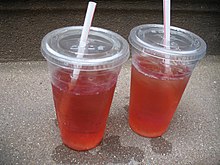
Plonk is a term used primarily in Commonwealth English for generally cheap, low-quality wine. Some believe it to come from Australian slang, in reference to blanc (the French word for "white"), before it became naturalised in Britain. Despite the reference to the colour white, the term is not limited to white wine, and can as easily indicate a red wine or rosé. In this context, the phrase has even spawned the title of a novel which evokes the perceived tackiness of the 1980s.
In Australia, plonk packaged and sold in a cask or simply in a bag is commonly called "goon". In New Zealand, such wine sold in a cask is often referred to as "Château Cardboard".
The term has also been adopted in other Commonwealth countries, particularly in Canada.
Other usages
The term is not always used in a wholly derogatory manner. It can indicate a degree of strange affection for the wine in question. Telegraph journalist Max Davidson has equated plonk with "youth, ... excess, ... self-indulgence in times of penury. Forget grown-up wine. With plonk, the sweetest bouquet of all is the taste of a few pence saved."
Today, the term can often be used to indicate that a particular social gathering is not a fancy affair. For example, if a party guest is worried about the social level of the occasion, a host might assuage his or her concerns with the phrase: "Oh, just bring a bottle of plonk." Indeed, probably the most famous literary use of "plonk" comes in Willy Russell's play Educating Rita. Working-class Rita decides she cannot attend a party to which academic Frank has invited her, since she is ashamed of the wine she has bought and feels out-of-place. When Rita reports her anxieties to Frank the following week, he castigates Rita for being too self-conscious, reassuring her: "It wouldn't have mattered if you'd walked in carrying a bottle of Spanish plonk."
Another well-known usage of the word was that of Horace Rumpole, the title character of John Mortimer's television series "Rumpole of the Bailey" (1975–1992). Rumpole would frequently suggest to a fellow barrister, and sometimes even a client, that they repair to Pomeroy's Wine Bar, to down a few glasses of plonk.
Health concerns
The Alcohol (Minimum Pricing) (Scotland) Act 2012 is an Act of the Scottish Parliament, which introduces a statutory minimum price for alcohol, initially 50p per unit, as an element in the programme to counter alcohol problems.
Minimum Unit Pricing (MUP) for alcohol is a policy measure being considered for adoption in several countries, including Ireland, Switzerland, Wales, and Poland, pending evidence of its effectiveness. In Scotland, despite strong public and parliamentary support, the implementation of MUP has faced legal challenges from the spirits industry. The passage suggests that instead of opposing such health-oriented policies, the alcohol industry could adopt less harmful business models. It cites France as an example, where the wine industry successfully transitioned from selling inexpensive "plonk" to quality wines produced in specified regions, resulting in increased profits and a reduction in deaths from alcoholic liver disease.
See also
References
- ^ winepros.com.au. "plonk". The Oxford Companion to Wine. Archived from the original on 8 August 2008.
- Publisher's website. "A Bottle of Plonk". Goldenford Publishers Ltd.
- McClintock, Alex (2 March 2015). "Happy birthday goon: cask wine turns 50". The Guardian. Retrieved 2 March 2015.
- Campbell, Bob "Chateau Cardboard – is boxed wine making a comeback?," businessdesk.co.nz, 19 September 2021. Retrieved 11 December 2024.
- Max Davidson (20 February 2008). "It's sour grapes, but you can't beat a £5 bottle". The Daily Telegraph. London. Archived from the original on 9 May 2008. Retrieved 22 May 2010.
- "Script from the film screenplay". Script-o-rama.
- Ephron, Hallie (26 November 2006). "The whiff of corruption, and Pomeroy's plonk". The Boston Globe.
- Sheron, N; Chilcott, F; Matthews, L; Challoner, B; Thomas, M (August 2014). "Impact of minimum price per unit of alcohol on patients with liver disease in the UK". Clinical Medicine. 14 (4): 396–403. doi:10.7861/clinmedicine.14-4-396. PMC 4952834. PMID 25099842.
https://sjmc.gov.au/wine-in-war-the-origins-of-plonk/
Categories: